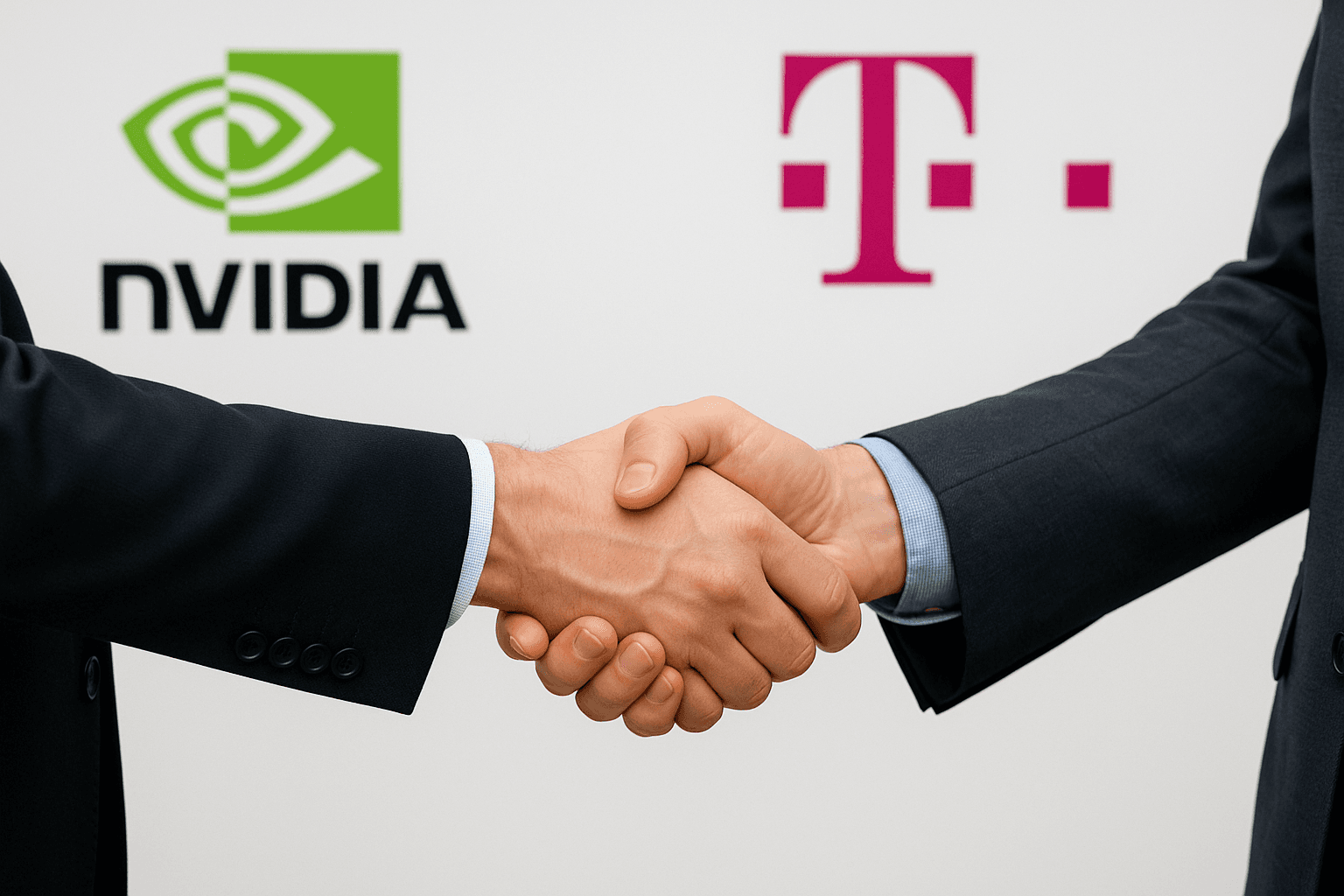Nvidia, Deutsche Telekom forge a $1.17B AI alliance

News Summary
Deutsche Telekom and Nvidia have formed a €1 billion ($1.17 billion) partnership to create an industrial AI cloud near Munich, expected to go live in early 2026. This project will boost Germany's AI computing power by 50% using 10,000 Nvidia GPUs, aiming to provide European companies with a secure, local platform for training complex AI models, thereby enhancing Europe's digital self-reliance. This initiative is part of the EU's broader €215 billion plan to expand AI capacity and represents Germany's first major operational milestone within this strategy. While smaller than a forthcoming US facility, the Munich project emphasizes sovereignty, scalability, and data protection, seeking to reduce dependence on foreign cloud providers. For Nvidia, this collaboration solidifies its position as a cornerstone of global AI infrastructure, while Deutsche Telekom strategically pivots towards cloud computing and AI-driven enterprise solutions.
Background
The European Union has launched a broad €215 billion strategy to expand its AI capacity and triple computing power. However, the plan's progress has been slow, weighed down by funding reviews and regulatory approvals. Against this backdrop, the partnership between Deutsche Telekom and Nvidia represents one of the first major operational milestones within this strategy. Globally, competition for AI infrastructure is intensifying, with nations and regions seeking to bolster their digital sovereignty and data governance capabilities. Europe, in particular, is focused on data protection and reducing reliance on non-European cloud providers, spurring localized, sovereignty-oriented projects like the Munich AI cloud.
In-Depth AI Insights
What are the deeper strategic implications of Germany's focus on "sovereignty, scalability, and data protection" in AI infrastructure, rather than purely on computing power scale? This strategy reflects Europe's long-term ambition for digital autonomy, aiming to build an AI ecosystem that adheres to its stringent data governance standards and reduces reliance on US and Chinese tech giants. - It's not just a technological deployment but a geopolitical strategy to maintain control in critical tech domains. - While potentially leading to a more fragmented AI infrastructure, it offers distinct competitive advantages and enhanced security for European businesses regarding regulatory compliance and data localization. - In the long run, it could foster indigenous European AI innovation and provide a potential model for other regions pursuing digital sovereignty. How will this partnership impact the competitive landscape for cloud providers and AI infrastructure specialists in Europe? Nvidia's position as a core hardware provider is further solidified, significantly expanding its influence within European industrial and corporate networks. - Deutsche Telekom's strategic pivot positions it as a significant regional AI cloud provider, potentially offering a differentiated advantage against hyperscalers like AWS, Microsoft Azure, and Google Cloud in markets prioritizing data sovereignty and localization. - SAP's involvement signals that integrated enterprise AI solutions and automation will be key competitive differentiators, possibly encouraging more European software companies to partner with local infrastructure providers. - Overall, it's likely to stimulate further investment in localized AI infrastructure across European nations to meet growing compliance and sovereignty demands, intensifying market competition and fostering niche service providers focused on specific vertical industries or regulatory requirements. What are the potential investment opportunities and risks stemming from Europe's fragmented, sovereignty-focused AI development strategy? Opportunities: - Data Sovereignty Solution Providers: European software and service companies specializing in data localization, privacy-preserving, and compliant AI solutions will find growth opportunities. - Vertical-Specific AI Applications: European industries and enterprises leveraging local, secure AI infrastructure can drive AI-powered innovation in their specific sectors, boosting competitiveness. - Continued Nvidia Growth: Nvidia's GPU demand will continue to benefit from global AI infrastructure investments, including those in Europe. - European Telcos and IT Service Providers: Companies like Deutsche Telekom, by strategically transforming into AI cloud providers, can unlock new growth avenues. Risks: - Disadvantage in Economies of Scale: A fragmented European AI infrastructure may lack the cost and efficiency benefits of scale enjoyed by global hyperscale cloud platforms. - Slower Market Penetration: Strict regulations and multi-national coordination could lead to a slower pace of AI technology adoption and deployment across Europe. - Interoperability Challenges: Different national and platform approaches to technical standards and data governance frameworks could increase the complexity of implementing cross-border AI projects.